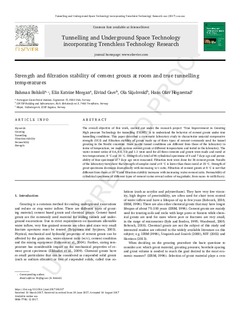Strength and filtration stability of cement grouts at room and true tunnelling temperatures
Journal article, Peer reviewed
Accepted version

Permanent lenke
http://hdl.handle.net/11250/2484402Utgivelsesdato
2017Metadata
Vis full innførselSamlinger
- NGI articles [1061]
Originalversjon
Tunnelling and Underground Space Technology. 2017, 71 193-200. 10.1016/j.tust.2017.08.017Sammendrag
The overall objective of this work, carried out under the research project “True Improvement in Grouting High pressure Technology for tunnelling (TIGHT)” is to understand the behavior of cement grouts under true tunnelling conditions. This paper describes a systematic laboratory study to characterize uniaxial compressive strength (UCS) and filtration stability of grouts made up of three types of cement commonly used for tunnel grouting in the Nordic countries. Since in-situ tunnel conditions are different from those of the laboratory in terms of temperature, we made various cement grouts at different temperatures and tested in the laboratory. The water cement ratios of 0.6, 0.8, 1.0 and 1.2 were used for all three cements and grouts were made and cured at two temperatures; 8 °C and 20 °C. Strength of a total of 96 cylindrical specimens of 4 and 7 days age and permeability of four specimens of 7 days age were measured. Filtration tests were done for 36 cement grouts. Results of the laboratory tests show that strength of samples cured at 8 °C is lower than those cured at 20 °C. Strength of grout specimens decreases dramatically with increasing w/c ratio. Filtration of cement grouts at 8 °C is not that different from those at 20 °C and filtration stability increases with increasing water-cement ratio. Permeability of cylindrical specimens of different types of cement varies several orders of magnitude; from nano- to milli-Darcy.